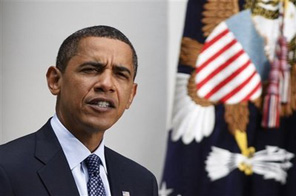Reconciliation pace tops WH talks
WASHINGTON:Concerns over the slow pace of political, religious and ethnic reconciliation in Iraq are expected to dominate President Barack Obama's talks at the White House with Iraqi Prime Minister Nouri al-Maliki.
With insurgent bombings and attacks still a major danger as Iraqi forces assume a larger police role there, Pentagon officials have voiced pessimism about any decrease in violence unless al-Maliki and his Shiite Muslim political allies become more flexible about sharing power with minority Sunnis and easing government control over Sunni regions and those dominated by ethnic Kurds.
Al-Maliki, who was to meet with Obama on Wednesday, has emerged as a political force from Iraq's Shiite Muslim majority and he has been unable or unwilling to forge the kind of political power-sharing and economic compromises that the U.S. sees as necessary for long-term stability.
The American invasion of Iraq to overthrow Saddam Hussein in 2003 ended minority Sunni Muslim rule in Iraq. The country's Shiites now hold all the levers of power and have shown little willingness to accommodate either the Sunnis or the Kurds in northeast Iraq.
A symptom of the political gridlock shows in the government's inability, after years of trying, to find an equitable method for sharing Iraq's vast oil wealth. Known reserves lie primarily in Shiite- and Kurdish-controlled regions.
Under a Status of Forces pact with the United States, American troops pulled out of major Iraqi cities on June 30. But some ranking members of the U.S. military have complained that the Iraqi army has shown little willingness to cooperate with American forces when swift counterinsurgency action is necessary and allowed under the agreement.
White House press secretary Robert Gibbs said Monday that those military concerns would be raised.
"I have no doubt that that will take up a large part of the meeting with the prime minister," he said.
Despite misgivings on those issues, the Obama administration appears ready to follow through on the remainder of the Status of Forces agreement, which calls for the withdrawal of all American combat forces by August 2010 and the remainder of U.S. troops by the end of 2011.
There are about 130,000 members of the U.S. military in the country, down by more than 30,000 since a peak reached in 2007 during the troop buildup ordered by President George W. Bush. That temporary rise in forces vastly reduced the sectarian violence that had racked the country.
During his stay in the United States, al-Maliki is expected to try to shift the focus to increasing American private investment in Iraq. He will speak to the U.S. Chamber of Commerce in Washington and was meeting with U.N. Secretary-General Ban Ki-moon in a bid to have Iraqi funds unfrozen. That freeze was imposed by the international community after Saddam's invasion of Kuwait in 1990.
Al-Maliki also will be seeking U.S. help with the Kurds, perhaps the strongest U.S. ally among Iraq's religious and ethnic groups, who are hotly resisting central-government controls. The Kurds want to take control over the oil-rich region surrounding the city of Kirkuk, viewed by Kurds as their historic capital — a move strongly opposed by the al-Maliki government.






